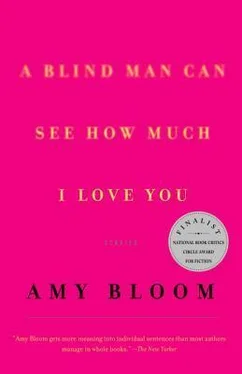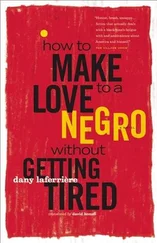I don’t have any salt-of-the-earth-type friends like Margeann. Margeanns are almost always crusty and often black and frequently given to pungent phrases and homespun wisdom. Sometimes they’re someone’s clever, sad-eyed maiden aunt. In men’s stories they’re either old and disreputable drinking buddies, someone’s tobacco-chewing, trout-fishing grandpaw, or the inexplicably devoted side-kick-of-color, caustic and true.
My friends in real life are two other writers, the movie critic for our nearest daily newspaper and a retired home-and-garden freelancer I’ve been playing tennis with for twenty years. Estelle, my tennis buddy, has more the character of the narrator than I do, and I thought I could use her experiences with Sandra to make a story line. Sandra had sprinkled her psychobabble dust all over poor Estelle, got her coming three times a week, cash on the table, and almost persuaded her to leave Dev, a very nice husband, to “explore her full potential.” Estelle’s entire full potential is to be the superb and good-natured tennis partner she is, a gifted gardener (which is where I got all that horticultural detail), and a poor cook and worse housekeeper for an equally easygoing man who inherited two million dollars when he was fifty and about whom I can say nothing worse than at eighty-three Dev’s not quite as sharp as he was, although he’s nicer. I could not imagine how else Estelle’s full potential, at seventy-seven, with cataracts in her left eye, bad hearing, and not the least interest in art, theater, movies, or politics, would express itself. I persuaded Dev to take her on a fancy cruise, two weeks through the canals of France, and when they came back, beaming pinkly a little chubby, and filled with lively remarks about French bread and French cheese, Estelle said nothing more about her underdeveloped potential and nothing more about meeting with Sandra.
I see that I make Sam sound more affably dodgy than he really is. He wouldn’t have caught my eye in the first place if he were no more than the cardboard charmer I describe, and he was tougher than Joe in the end. Even if Sandra hadn’t been a bad mother, I might have imagined a complex but rosy future with Sam and Miranda, if I were capable of imagining my future.
I don’t know what made Sandra think I would be her accomplice. If you are thin and blondly pretty and used to admirers, maybe you see them wherever there are no rivals. But hell, I read the ladies’ magazines, and I drove all the way to Westport for the new haircut and spent a lot of money at various quietly chic and designery stores, and although she didn’t notice that I was coming over in silk knit T-shirts and black jeans, Sam did. When Sandra called me, whispering from Joe’s bed, “Ohmigod, make something up, I lost track of the time,” I didn’t. I walked over and made dinner for Sam and Miranda, and while Miranda sat in front of her computer, I said, “I’m a bad liar. Sandra called from Joe’s. She asked me to make something up, but I can’t.”
There is no such thing as a good writer and a bad liar.
After she moved out, she called me most mornings to report on the night before. She was in heaven. Joe was a sex god, but very jealous of Sam. Very silly, of course. Very flattering.
I called Joe in the late afternoons. I said, “Oh, Sandra’s not there? Oh, of course.” Joe was possibly the most easily led person God ever made. I didn’t even have to drop a line, I just dangled it loosely and flicked. I said, “She’s not at the office. She must be at home. I mean, at Sam’s. It’s great that they’re getting along, for Miranda’s sake. Honestly, I think they’re better friends now that they’re separated.”
I did that twice a week, alternating times and varying my reasons for calling. He hit her once. And she told me and I touched the greenish bruise along her jaw and begged her to press charges, for a number of reasons, but she didn’t.
The part where Joe drove his car into the back of Sam’s house is too good to leave out too, and tells funnier than it really was, although the rear end of his pickup sticking out through acres of grape arbor was pretty amusing, as was the squish-squish of the grapes as Joe tried to extricate himself, and the smell of something like wine sweeping over us as he drove off, vines twirling around his tires.
I reported Sandra to the Ethics Committee of the Connecticut Society for Marriage and Family Counselors. Even though the best of them hardly have anything you could pass off as ethics, all the things she told me — her financial arrangements with her patients, and the stock tips they gave her, and her insistence on being paid in cash, and in advance — and the fact that I, who was no kind of therapist at all, knew all these things and all her clients’ names, was enough to make them suspend her license for six months.
Sophisticated readers understand that writers work out their anger, their conflicts, their endless grief and rolling list of loss, through their stories. That however mean-spirited or diabolical, it’s only a story. That the darkness in the soul is shaped into type and lies there, brooding and inert, black on the page, and active, dangerous, only in the reader’s mind. Actually, harmless. I am not harmless.
The story I began to write would have skewered her, of course. Anyone who knew her would have read it and known it was she and thought badly of her while reading. She would have been embarrassed and angry. That really is not what I have in mind. I want her skin like a rug on my floor, warm throat slit, heart still beating behind the newly bricked-up wall. In stories, when someone behaves uncharacteristically, we take it as a meaningful, even pivotal moment. If we are surprised again and again, we have to keep changing our minds, or give up and disbelieve the writer. In real life, if people think they know you, know you well enough not only to say, “It’s Tuesday, Amy must be helping out at the library today,” but well enough to say to the librarian, after you’ve left the building, “You know, Amy just loves reading to the four-year-olds, I think it’s been such a comfort to her since her little boy died”—if they know you like that, you can do almost anything where they can’t see you, and when they hear about it, they will, as we do, simply disbelieve the narrator.
I find that I have no sympathy with the women who have nannies on top of baby-sitters on top of beepers and pagers and party coordinators, or with the ones who want to give back their damaged, distressing adopted children, or with the losers who sue to get their children back from the adequate and loving parents they gave them to three years before. In my world none of them would be allowed to be mothers, and if they slipped through my licensing bureau, their children would be promptly removed and all traces of their maternal claims erased.
I can’t say I didn’t intend harm. I intended not only harm but death, or if not her death, which I think is a little beyond my psychological reach, then her disappearance, which is less satisfying because it’s not permanent but better because there is no body.
As Sandra’s dear friend and reliable baby-sitter, it was easy for me to hire Joe to do a little work on my front porch, easy to have him bump into my research assistant, the two of them as much alike as two pretty quarter horses, easy to fuel Sandra’s anxious wish to move farther out of town. Easy to send the Ethics Committee the information they needed to remove her license permanently, easy to suggest she manage Joe’s business, easy to suggest that children need quality time, not quantity, and that young, handsome lovers need both, easy to wave Sandra and Joe off in a new truck (easy to come up with ten thousand dollars when you are such a steady customer of the local bank and own your home outright).
Читать дальше












